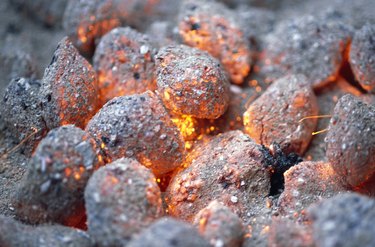
A centuries-old practice of scattering wood ash across the garden provides potassium to plants and can help raise the pH of acidic soils. Traditionally, briquettes used in grilling food were nothing more than cinders of pure wood. Today, manufactured charcoal briquettes are infused with numerous additives to improve ignition and to control burning temperature and burning longevity. Do not use ash created from barbecue briquettes on the garden or in the compost pile as it contains various toxins.
Charcoal Ash
Video of the Day
Although charcoal briquettes originate as biodegradable wood and possess numerous trace minerals, lots of impurities exist through their manufacture. Modern charcoal used in grills is infused with many additives that are engineered to make the grill easy to light and manage during meal preparation. Some of the impurities in charcoal briquettes include coal dust, starch, sodium nitrate, limestone and borax, all varying by brand. Often, sodium dioxide remains in the ashes as a result of combustion reactions. Once mixed with water, sodium dioxide may become sulfuric acid.
Video of the Day
Effects on Plants
Ash from charcoal briquettes contains too many toxins and residues for use in the garden as a fertilizer. Do not dispose of this ash in the compost pile, as it will bring contaminants into the humus material later scattered atop the soil. Creating a debris pile just of charcoal ash is an option, but the concentration of the ash and salts will cause nearby plants, such as grass or weeds, to die. Since rain will wash the charcoal ash across a landscape, it's best to dispose of barbecue briquette ash in a fireproof container for proper disposal in a landfill or other safe, nonvegetated site.
Wood Ash
Pure, dry wood chips or logs used to make a fire pit in making food may be used in a garden as fertilizer. As long as the wood is not treated with a lighter fluid, the combusted wood breaks down into basic nutrients that are usable by plants. Wood ash contains substantial amounts of calcium, potassium and phosphorus. These elements are initially bound in salt forms, so it's important to scatter wood ash broadly and lightly. A pile of wood ash can leach salts once wetted, leading to root burn from the high salt concentrations, as in the case when potassium hydroxide forms.
Using Wood Ash
Scattering wood ash on a garden is not always necessary. If your garden soil naturally is rich in potassium, regular applications of wood ash before the planting season is more work than true benefit. Likewise, since wood ash can raise the pH of soil, adding it to alkaline soil only creates a more alkaline soil environment, often to the detriment of most plants. Do not scatter wood ashes around plants that need an acid soil environment to stay healthy. Wood ash is helpful in changing acidic soils to become more neutral in pH, making the soil more conducive for growth of many common vegetable crops.